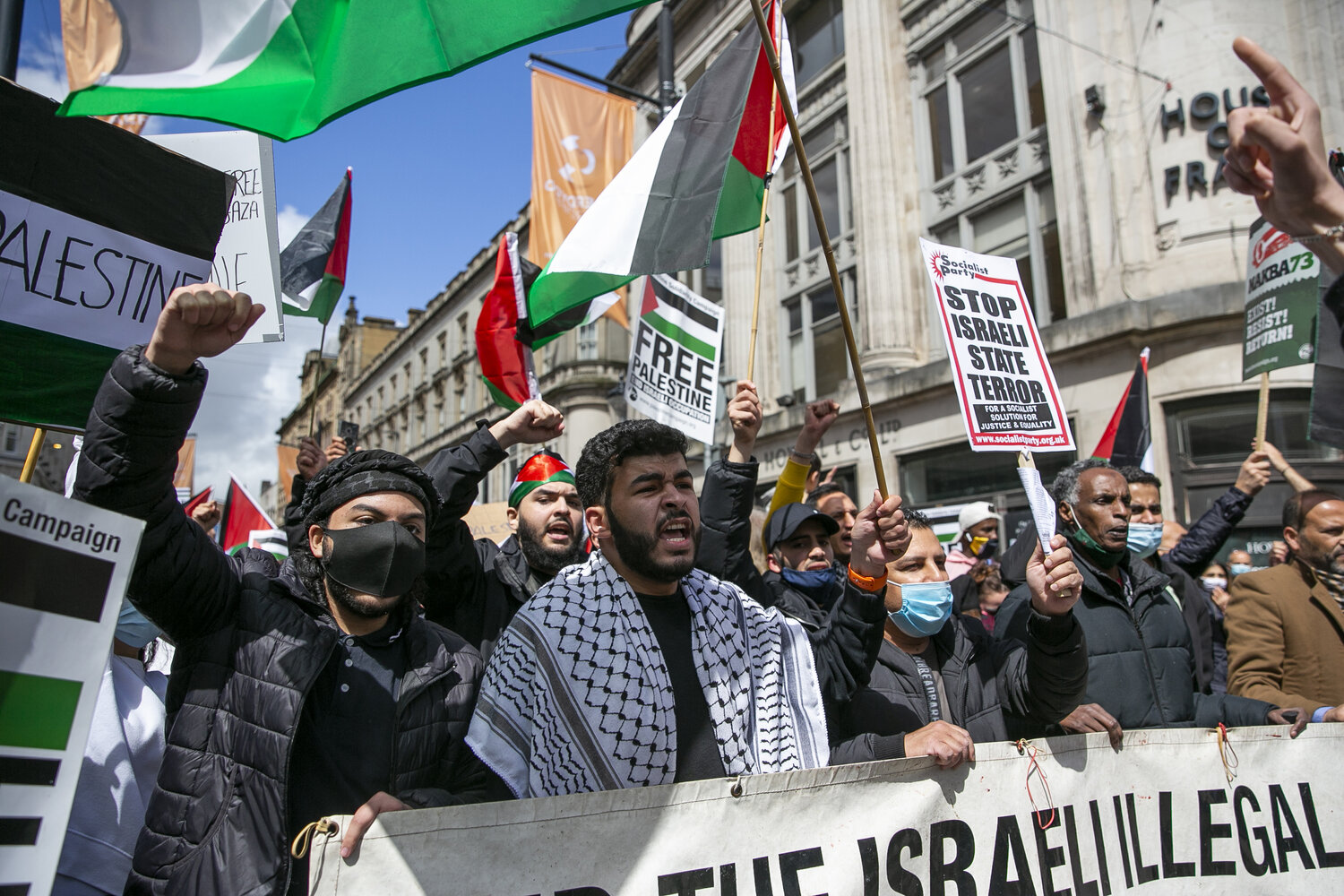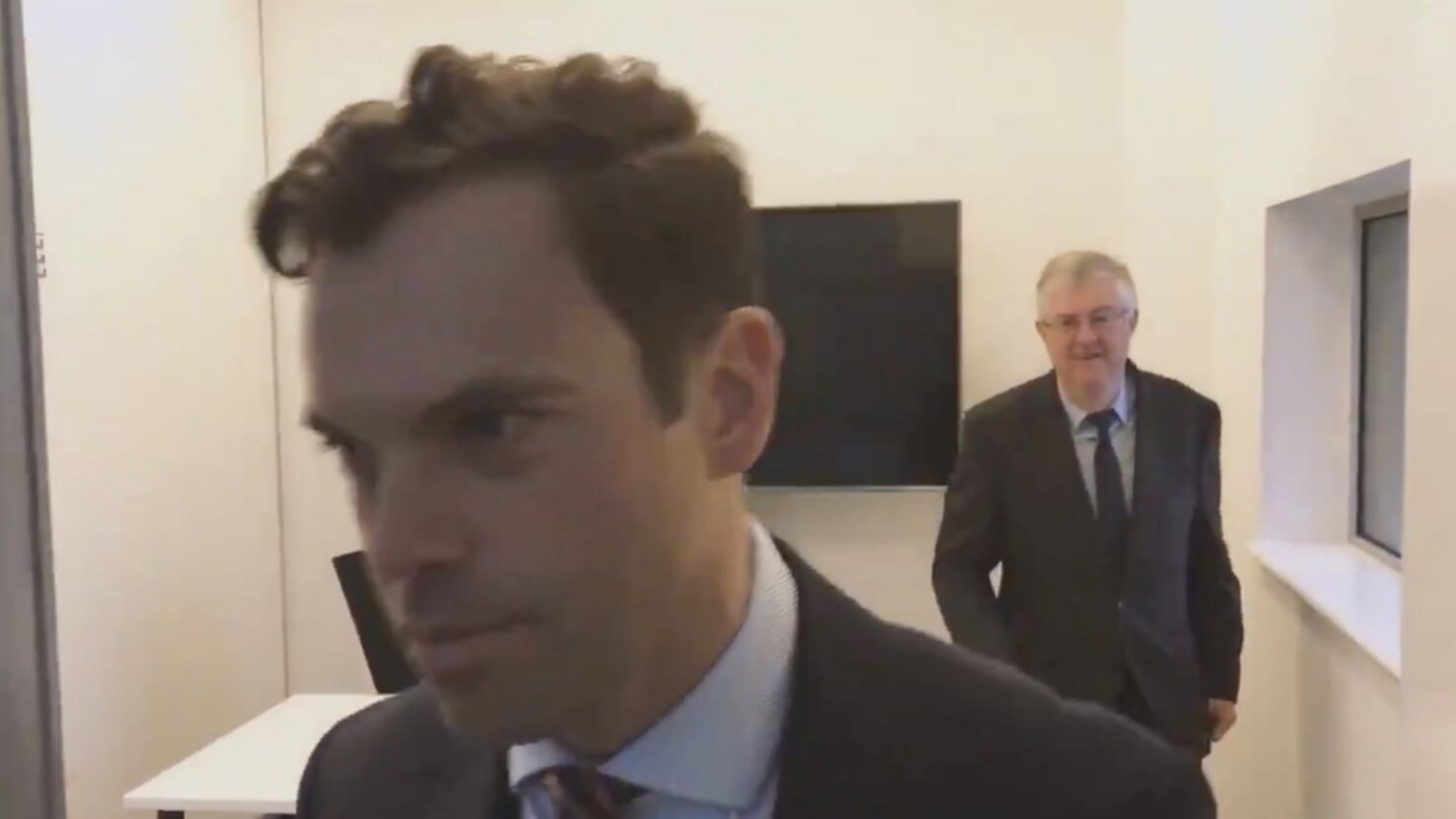
Wave of Protests in Towns & Rural Areas Sees Palestine Solidarity Take Root Across Wales
The large Palestine solidarity protest tin Cardiff last weekend. But smaller towns across Wales have also seen a wave of action over the issue. Photo: Tom Davies
THE SERIES OF ACTIONS ACROSS WALES MARKS GROWING OPPOSITION TO ISRAEL AND A NEW PHASE OF THE PALESTINE SOLIDARITY MOVEMENT.
SC Cook
In Cardiff last Saturday, a crowd of other 1,000 filled the streets with Palestinian flags and chants of “Gaza, Gaza, don’t you cry, Palestine will never die!”
The size and sheer energy of the crowd exceeded the expectations of the organisers, and was in keeping with the huge protest in London on the same day, where some 150,000 took to the streets. A day later, around 900 came out in Swansea, a city with a proud history of Palestine solidarity and anti-imperialist struggle. An important feature of the protests has been their multicultural dimension, with a strong presence from Wales’ Muslim communities in a way reminiscent of the anti-Iraq war demonstrations of the noughties .
But there has also been another striking dynamic to the movement in Wales: the spread of smaller protests in Welsh towns and rural areas.
So far, after contacting people across Wales, voice.wales has found out that pro-Palestine protests have taken place or are planned in Pontypridd, Barry, Bangor, Aberystwyth, Machynlleth, Newtown, Llanidloes, Presteigne, Abergavenny, Knighton and Wrexham.
Taken together, they represent the biggest protest movement in Wales this year, and the largest since the Black Lives Matter movement rocked the country in 2020. They are part of a growing international opposition to Israel and crucially, powerful resistance from Palestinians themselves.
The majority of the protests in Wales have been organised by the Palestine Solidarity Campaign (PSC), but some have been more spontaneous.
The organisers say that a network of long standing activists has been key to the spread of the events, with individuals taking the initiative and tapping into a wider mood for action among a younger generation.
“We’re heartened to see protests all around Wales in response to Israel’s latest attacks on Palestinians,” a spokesperson for PSC told voice.wales.
“We are in touch with each other and will work together beyond this ceasefire to build the campaign for Boycott Divestment and Sanctions against Israel, and support Palestinians in their fight against oppression,” they continued. “Our nation has a proud history of International solidarity, we stood against South African Apartheid in the 80s and we stand against Israeli Apartheid today.”
Aberystwyth – “organically and spontaneously organised by students.”
In Aberystwyth, the university town which has seen a series of ‘Kill the Bill’ protests in recent months, a crowd of over 100 turned out last Sunday to protest.
“It went really well,” says Dinah Mulholland, an activist who attended the event. “Another event in Aberystwyth that has been organically and spontaneously organised by students, rather than by specific organisations, who have then joined in support.”
She says that recent political activity in the town fed into the demonstration and the different movements are coming together.
“I think it really helped that at the last Kill the Bill protest, we had a speaker from the Palestine Refugee Project, which is a local group,” Dinah says.
The next Kill the Bill (KTB) event – planned for the 29th May – is entitled “Ceredigion KTB stands up for Colombia and Palestine,” where speakers from the Palestine Refugee Project, and Colombian speakers from Machynlleth – talking about the uprising that has taken root in the South American country in recent weeks- will address the rally.
A new Ceredigion Palestine Action group has now been set up on the back of the protests.
Dinah believes that people are now wanting to move into action, and there are plans for a local “Boycott Israeli Apartheid campaign,” with stickers already being made to put on Israeli products in shops, in similar tactics to those used to fight Apartheid in South Africa.
“Areas in mid Wales do not see much by way of protests normally.”
Meanwhile, up the road in Machynlleth, a town with a population of just 2,220, over 50 people gathered at the Clock Tower last weekend. It was a similar story elsewhere, from Wrexham down to Abergavenny and Presteigne. More protests are planned for this weekend in other towns as the movement spreads.

“Areas in mid Wales do not see much by way of protests normally,” says John Brooks, from Montgomeryshire Palestine Solidarity Campaign, who have been helping to coordinate the protests.
He says that having people prepared to call local protests is vital, but that he has also noticed a “shift in opinion” towards greater sympathy with the plight of Palestinians. “This is mirrored in a softer tone in the media and has helped awareness of the issues.”
He says that these smaller protests are crucial to show the government here and in Israel that there is solidarity for Palestine across the whole of Wales. “Also the Palestinian people are aware of the demonstrations,” he says. “They know that they are not alone.”
Another feature of the protests is they have also happened in places where the right have tried to gain more of a foothold in recent years.
On Wednesday night, over 100 people turned out in Barry, a large coastal town south of Cardiff. The constituency it sits in – the Vale of Glamorgan – voted Tory at the general election and was a key target for the party at the recent Senedd elections, but was won by Welsh Labour in the end.
The town also saw a large Black Lives Matter protest last year, but the demonstration this week may have been the first time ever that a Palestine solidarity protest was held in Barry. At the end of a lively protest, young women led a spontaneous march on the council offices. On Friday, school students at Fitzalan High School in Cardiff – where previous Climate Strikes have been strong – staged a lunchtime protest for Gaza.

Slow cruise For Palestine
As well as demonstrations, a ‘slow cruise’ is planned for Sunday, where motorists will wave Palestinian flags from their cars and drive down the M4, all the way to Cardiff. One of the organisers of the event, a Muslim man from Swansea who has visited Palestine many times, said that the point of the cruise was to “bring attention to the oppression of Palestinians and the illegal occupation of Palestinian land.”
“By cruising slowly into the capital we aim to highlight to passers-by the cause and to ensure the authorities hear our demands.”
The man, who didn’t want to be identified, described the scale of the protests across Wales as “unprecedented” and said the support was “amazing” and showed “normal people standing against injustice.”
This movement has grown in response to the Israeli bombing raids on Gaza. Of the 219 people who have been killed in Gaza, at least 63 are children, according to its health ministry. Of the 10 people killed in Israel, two children are among the dead.
On Tuesday 18th May, 11 children who were all receiving trauma counselling from the Norwegian Refugee Council were killed by Israeli air strikes in Gaza. All the children, aged between 5 and 15 years old, were killed in their homes, sometimes along with relatives, in densely populated areas of Gaza.
Writing in Haaretz, the journalist Amira Hass explained that: “Fifteen Palestinian nuclear and extended families lost at least three, and in general more, of their members, in the Israeli shelling of the Gaza Strip during the week from May 10.”
In an article titled “Gaza Lives Erased: Israel Is Wiping Out Entire Palestinian Families on Purpose,” Hass says that the Israeli military know which buildings have families living in them prior to bombing.
At the same time, continual air raids have downed power lines and smashed vital piping and infrastructure, leaving human waste to spill out of the ground in the blockaded strip.
But the scale of Palestinian resistance has been unprecedented in recent times. On Tuesday, the first Palestinian general strike in generations shut down large parts of the economy.
The strike, which took place in the West Bank, Jerusalem and in historic Palestinian cities within Israel’s official borders, reportedly hit building sites, causing estimated losses of nearly $40 million. Unlike previous strikes, the action this time by workers was “pushed and organised by ordinary Palestinians,” according Middle East Eye.
Israel is trying to crack down on the resistance in increasingly desperate but barbaric ways.
On the day of the strike, the Sky Journalist Mark Stone, reported that the Isreali police and military had gone into the Palestinian area of Sheikh Jarrah, East Jerusalem, and sprayed skunk water into a community, entirely unprovoked, in a form of racialised collective punishment.
This, he explained, “happens a lot,” and the stench from the spray takes days to get rid of.
The ‘appalling’ silence from Mark Drakeford.
Against this backdrop, and the wave of protests that have erupted in Wales as a response, there has been almost total silence from Mark Drakeford. The First Minister has only released a statement with the Interfaith Council for Wales that referred to ‘events in the Middle East’ having taken a ‘deeply worrying and deadly turn.’ There was no mention of Israel or Gaza.
On Tuesday, a picket was held outside the Welsh Government to demand the Welsh Labour leader ends his silence, with one placard reading: “Mark Drakeford: speak out against Israeli apartheid.”
The most senior politician in Wales to address the issue directly is Plaid Cymru leader Adam Price, who acknowledged the protests in Wales and said the party was “deeply concerned about the actions of the Israeli government in recent days.” He added that “the illegal evictions in Sheikh Jarrah” had to stop and called on Drakeford to act.
When asked by voice.wales for their response to Mark Drakeford’s silence, Cardiff Palestine Solidairty campaign said they were “disappointed and surprised that the First Minister has not expressed support for the Palestinian people.” They added that they would be seeking a face-to-face meeting to discuss the issue directly with him.
The organiser of the ‘slow cruise’ said he was appalled at what he said was Mark Drakeford’s “hypocrisy.”
“Our politicians are complicit and turn a blind eye,” he said. “I’m appalled at their hypocrisy and lack of ability to uphold their own policies.”
He said Mark Drakeford’s claim of being internationalist was hollow and that it was only done for publicity. “The reality is they are capitalist driven and do not value the lives of those suffering. Even on our own doorstep people suffer from hunger and hardship.” he said. “Yet they fail to address these issues”
As Palestinians welcome news of a ceasefire that had been forced on Israel by the scale of the resistance, they know that the long war against them will continue.
The movement in Wales now faces questions around where it will go next and how it will grow.
Adam Johannes, a long standing Palestine activist who has also been involved in the Stop the War coalition, has attended various protests over the past week and said they showed a desire for militancy and action.
“In Cardiff and Barry it was noticeable that by the end, young people were heading up the marches, leading the chants, making the impromptu speeches, sitting down in the roads, clambering atop walls, bins, statues and benches to wave the Palestinian flag and shout slogans.”
He said that the wave of school student strikes could lay the basis for a new Palestine movement that had anti-racist and anti-imperialst politcs at its heart.
“It’s vital that the youth leadership is supported as these are tomorrow’s workplace militants, organic intellectuals, movement builders and organisers and foundation for a new left,” he said.


